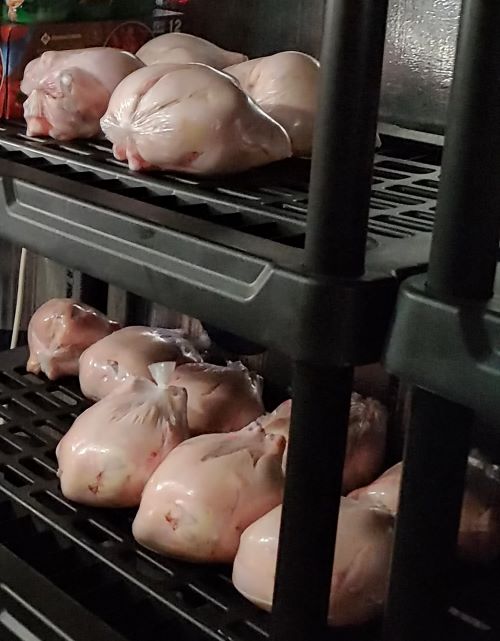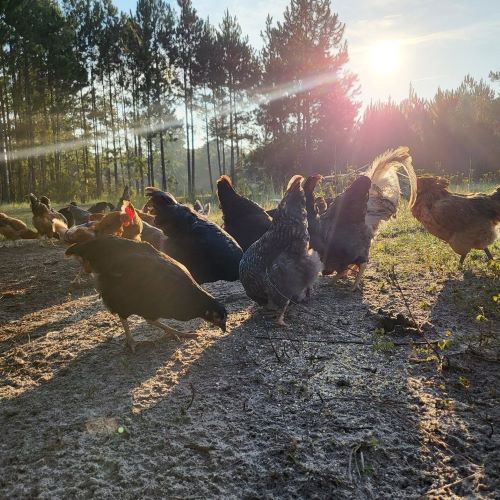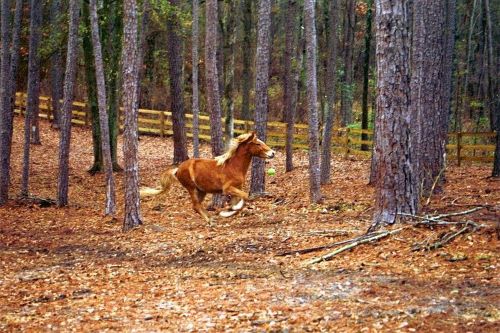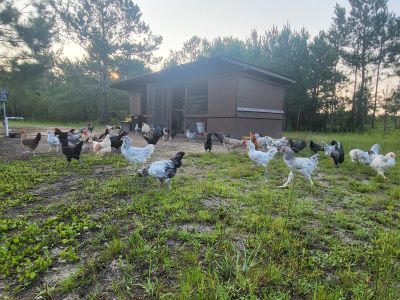Feeding the Future: Exploring Joel Salatin’s Pastured Poultry Technique
Definition of Pastured Poultry
Pastured poultry refers to a progressive and environmentally conscious method of raising chickens that centers on their natural behaviors and well-being. In this approach, chickens are allowed to roam and forage outdoors on fresh pasture, mimicking their ancestral instincts. They are not confined to overcrowded indoor spaces, but rather have access to open pastures and grassy areas, promoting a healthier and more balanced lifestyle.
Joel Salatin’s Contribution to Sustainable Farming
At the forefront of the pastured poultry movement stands Joel Salatin, an influential farmer and advocate of sustainable agriculture. His innovative techniques have challenged conventional farming practices, offering a refreshing perspective on how chickens can be raised more ethically and sustainably.
Salatin’s pioneering approach involves rotational grazing, where chickens are frequently moved to new areas of pasture. This not only ensures the birds have access to fresh forage and insects, but it also fosters a positive impact on the land by preventing overgrazing and promoting soil regeneration. His use of portable chicken shelters, known as “chicken tractors,” provides protection from predators and adverse weather conditions while allowing the chickens to enjoy the outdoors.
By exploring Joel Salatin’s pastured poultry technique, we embark on a journey to discover the myriad benefits of this method, from its positive influence on animal welfare to the exceptional quality of the meat it yields. Let us delve deeper into the realm of pastured poultry, where ethical farming practices and delectable flavors converge, shaping the way we feed the future.
Benefits of Pastured Poultry
Enhanced Animal Welfare and Natural Behavior
One of the most significant advantages of pastured poultry is the improved animal welfare it provides. Unlike conventional methods, where chickens are confined to tight spaces, pastured poultry allows these birds to express their natural behaviors. They can roam, scratch, and forage freely on fresh pastures, leading to reduced stress levels and healthier, happier chickens.
With ample access to open spaces and natural environments, pastured poultry promotes a more balanced and fulfilling lifestyle for the birds. This ethical approach to raising chickens aligns with Joel Salatin’s philosophy of respecting the intrinsic needs of the animals under his care.
Nutrient-Dense and Flavorful Meat
Pastured poultry offers a delectable and nutrient-rich alternative to conventionally raised chicken meat. The chickens’ varied and natural diet, consisting of grass, insects, seeds, and plants, enhances the flavor and nutritional profile of the meat.
Studies have shown that pastured poultry meat contains higher levels of omega-3 fatty acids, essential for heart health, and lower levels of unhealthy saturated fats. Additionally, the meat is known for its higher levels of vitamins, minerals, and antioxidants, which contribute to a more wholesome and satisfying dining experience.
Regenerative Impact on the Land
Another noteworthy benefit of pastured poultry is its regenerative impact on the land. The rotational grazing system employed by Joel Salatin and other pastured poultry farmers promotes soil health and biodiversity.
As the chickens forage and graze, they naturally fertilize the soil with their droppings. This nutrient-rich manure improves soil fertility and contributes to healthier pastures. The regular rotation of the chickens prevents overgrazing, allowing the land to regenerate and maintain its ecological balance.
By embracing pastured poultry, farmers can play a vital role in regenerating the environment, creating a positive impact that extends beyond the dinner plate.
As we witness the enhanced welfare of the chickens, indulge in the flavor of the meat, and witness the positive impact on the land, the benefits of pastured poultry become evident. This ethical and sustainable approach to raising chickens offers a glimpse into a more harmonious future of food production and consumption, where the welfare of animals, the quality of our meals, and the health of our planet are all interconnected.
Joel Salatin’s Pastured Poultry Model
Rotational Grazing and Chicken Tractors
At the heart of Joel Salatin’s pastured poultry technique lies the concept of rotational grazing. Unlike conventional chicken farming, where birds are confined to static coops or barns, Salatin’s approach involves regularly moving the chickens to fresh pastures.
This rotational system benefits both the chickens and the land. By moving the birds frequently, they are provided with access to new and nutrient-rich forage, promoting a diverse and balanced diet. At the same time, the previous areas they grazed are given time to regenerate, avoiding overgrazing and preserving the health of the pasture.
To facilitate this rotational grazing, Salatin employs “chicken tractors,” portable chicken shelters mounted on wheels. These structures allow the chickens to graze freely in a controlled area, ensuring they have access to fresh grass and insects while protecting them from predators and harsh weather conditions.
Access to Fresh Forage and Insects
In Joel Salatin’s pastured poultry model, access to fresh forage and insects is a crucial element. Unlike conventional chicken feed, which is often grain-based, the chickens are encouraged to forage and scratch in the pasture for their food.
This natural diet supplements the chickens’ nutrition, providing them with essential vitamins, minerals, and protein from insects and plants. As a result, the meat from these chickens becomes richer in nutrients and possesses a unique and delicious flavor profile, distinguishing it from conventionally raised chicken meat.
Movable Shelters and Predator Protection
The movable chicken tractors not only support rotational grazing but also provide a safe and secure environment for the chickens. The portable design allows for easy relocation to fresh pasture, where the birds can continue their foraging activities.
Furthermore, these shelters offer protection from predators, reducing the risk of predation and stress on the chickens. By moving the chickens to different areas, Salatin effectively disrupts any patterns that may attract potential predators, ensuring the safety and well-being of the flock.
Joel Salatin’s pastured poultry model exemplifies an innovative and ethical approach to raising chickens. By implementing rotational grazing, providing access to fresh forage and insects, and utilizing movable shelters, Salatin demonstrates how regenerative farming practices can harmonize with nature, fostering a more sustainable and environmentally conscious future of poultry production. The combination of these methods results in healthier and happier chickens, delectable and nutrient-rich meat, and a positive impact on the land and ecosystem.
Ethical and Sustainable Farming Practices
Promoting Biodiversity and Soil Health
Central to Joel Salatin’s pastured poultry model is the promotion of biodiversity and soil health. By allowing chickens to graze on a rotational basis, the land is given ample time to recover and regenerate naturally. This approach fosters diverse plant growth and encourages the proliferation of beneficial microorganisms in the soil.
As chickens forage, scratch, and fertilize the pasture with their droppings, they contribute to the nutrient cycling process, enriching the soil with essential nutrients. The result is a more vibrant and resilient ecosystem that supports not only healthier chickens but also a wider range of flora and fauna.
Reduced Environmental Footprint
Compared to conventional chicken farming, which relies heavily on resources such as water, feed, and energy, Joel Salatin’s pastured poultry technique demonstrates a reduced environmental footprint. The rotational grazing system and reliance on natural forage significantly reduce the need for supplemental feed, leading to lower agricultural inputs.
Additionally, the minimal use of antibiotics and chemicals in pastured poultry farming further contributes to a cleaner and more sustainable environment. By employing ethical and sustainable practices, pastured poultry becomes an environmentally conscious alternative that aligns with the principles of regenerative agriculture.
Respecting the Natural Rhythms of Farming
In contrast to industrial farming methods that operate on rigid schedules and high-intensity production, Joel Salatin’s pastured poultry model respects the natural rhythms of farming. By allowing chickens to forage and graze at their own pace, and by rotating them through pastures accordingly, Salatin embraces a more harmonious approach to poultry husbandry.
This respect for nature’s rhythms extends beyond the chicken coop and pasture, shaping the overall philosophy of responsible and ethical farming. Emphasizing the cyclical patterns of life and growth, pastured poultry farming reinforces the interconnectedness between animals, land, and humans, fostering a deeper appreciation for the delicate balance of ecosystems.
By embracing ethical and sustainable farming practices, Joel Salatin’s pastured poultry model exemplifies a harmonious coexistence with nature, enhancing the welfare of the chickens, nurturing the health of the land, and preserving the planet for future generations. The next section explores the nutritional advantages of consuming pastured poultry, revealing how this environmentally friendly and compassionate approach to poultry production extends its benefits from the farm to the table.
Nutritional and Health Benefits
Omega-3 Fatty Acids and Lower Fat Content
One of the standout nutritional advantages of consuming pastured poultry lies in its higher levels of omega-3 fatty acids. Omega-3s are essential polyunsaturated fats known for their heart-healthy properties and potential to reduce inflammation.
Chickens raised on fresh pasture have access to a diet rich in omega-3s, which they accumulate in their muscle tissues. As a result, the meat from pastured poultry contains significantly higher levels of these beneficial fats compared to conventionally raised chicken.
Moreover, pastured poultry tends to have lower overall fat content due to their active lifestyle and healthier diet. This combination of reduced saturated fat and increased omega-3s contributes to a more balanced and heart-friendly nutritional profile.
Vitamins and Minerals from Diverse Forage
The varied and natural diet of pastured poultry contributes to the meat’s enhanced nutritional value. As the chickens forage on fresh grass and insects, they consume a wide range of vitamins and minerals that are naturally present in their forage.
Studies have found that pastured poultry has higher levels of essential nutrients such as vitamins A, D, E, and K, as well as beneficial minerals like calcium, magnesium, and zinc. These micronutrients play crucial roles in supporting overall health, bone strength, and immune function.
By choosing pastured poultry, consumers can benefit from a more nutrient-dense and wholesome source of protein, offering a delectable and nourishing addition to their diet.
Reduced Antibiotic and Chemical Exposure
One of the concerning aspects of conventionally raised chicken is the potential exposure to antibiotics and synthetic chemicals. Industrial chicken farming often relies on antibiotics for growth promotion and disease prevention in crowded conditions.
In contrast, Joel Salatin’s pastured poultry model emphasizes a reduced need for antibiotics, as the chickens enjoy healthier living conditions and lower stocking density. Additionally, pastured poultry farming tends to steer clear of synthetic chemicals, creating a more natural and clean environment for the birds.
By consuming pastured poultry, consumers can make a conscious choice to reduce their exposure to unnecessary antibiotics and chemicals, promoting better health and supporting more sustainable agricultural practices.
As we explore the nutritional and health benefits of pastured poultry, we gain a deeper understanding of how responsible and ethical farming practices positively impact both the environment and our well-being. The next section will focus on consumer awareness and informed choices, empowering readers to play an active role in supporting local farmers and embracing sustainable food options for a better food future.
Consumer Awareness and Informed Choices
Identifying Genuine Pastured Poultry Products
As consumer awareness of ethical and sustainable food choices grows, it becomes crucial to identify genuine pastured poultry products. When purchasing poultry labeled as “pastured” or “free-range,” it’s essential to understand the variations in farming practices behind these labels.
Look for products from reputable farmers or suppliers who adhere to Joel Salatin’s pastured poultry model. Genuine pastured poultry comes from chickens that have had access to fresh pastures, natural forage, and movable shelters, ensuring their well-being and ethical treatment.
Certifications from organizations like the American Pastured Poultry Producers Association (APPPA) can provide further assurance of the product’s authenticity and adherence to ethical farming practices.
Supporting Local Farmers and Sustainable Agriculture
Supporting local farmers who practice ethical and sustainable agriculture is an empowering way to make a positive impact on the food system. By choosing pastured poultry from local farms, consumers not only enjoy fresher and more flavorful meat but also contribute to the growth of regenerative farming practices in their communities.
Local farmers often prioritize transparency, allowing consumers to connect directly with the source of their food. This engagement fosters a deeper understanding of the food production process and strengthens the connection between consumers and the land from which their food originates.
Conscious Consumption for a Better Food Future
As consumers, we have the power to shape the future of food production and consumption. Making informed choices, such as opting for pastured poultry, supports environmentally friendly and ethical farming practices that prioritize animal welfare, biodiversity, and soil health.
Beyond pastured poultry, consider incorporating more sustainably produced foods into your diet, such as organic fruits and vegetables, grass-fed beef, and locally sourced produce. By embracing conscious consumption, we can collectively promote a more sustainable and resilient food system for future generations.
Educating ourselves and others about the benefits of pastured poultry and sustainable agriculture allows us to become advocates for positive change in the food industry. By supporting farmers like Joel Salatin who champion ethical and regenerative practices, we contribute to a healthier planet and a more secure food future for all.
As we conclude our exploration of Joel Salatin’s pastured poultry technique and its manifold benefits, let us be inspired to take action in our own lives, making mindful choices that nourish our bodies, honor the welfare of animals, and preserve the vitality of the earth we call home.
Conclusion
Embrace the Flavor and Ethics of Pastured Poultry
As we delve into the world of Joel Salatin’s pastured poultry technique, we uncover a truly remarkable approach to chicken farming—one that resonates with the principles of ethical and sustainable agriculture. Pastured poultry not only delivers delectable and nutrient-dense meat but also embodies a profound commitment to the welfare of the animals and the health of the land.
By embracing pastured poultry, we savor the rich flavors of meat nurtured through natural forage and rotational grazing. We recognize that our food choices can make a significant difference in the lives of animals and the quality of our meals.
Empowering Sustainable Farming and Healthier Eating
Choosing pastured poultry goes beyond enjoying a superior dining experience; it is an act of empowerment. By supporting farmers like Joel Salatin, who exemplify sustainable and regenerative practices, we contribute to the flourishing of ethical farming methods and the preservation of our planet’s resources.
Pastured poultry offers a nutritional advantage, providing us with a protein source abundant in essential nutrients and beneficial fats. This conscientious choice aligns with our quest for healthier eating and a balanced lifestyle.
The Future of Farming – A Vision of Responsible Food Production
Joel Salatin’s pastured poultry model invites us to envision a brighter future of food production—one where responsible farming practices and consumer awareness shape the landscape of agriculture. By celebrating the harmony between animals, land, and humans, pastured poultry showcases the potential for a sustainable food system that supports the well-being of all living beings.
As we move forward, let us remember the impact of our choices as consumers. Each decision to support pastured poultry and other sustainable food options is a step toward building a future where ethical considerations and ecological preservation guide the way we nourish ourselves and our communities.
In closing, let us embrace the flavor and ethics of pastured poultry, knowing that each bite is an affirmation of responsible and compassionate food production. As we empower sustainable farming practices and embrace healthier eating, we contribute to the vision of a future where the heart of farming lies in nurturing life and honoring the natural rhythms of the earth. Together, we can pave the way for a more enlightened and sustainable food future, feeding not only our bodies but also the soul of our shared planet.
Related FAQ
What is pastured poultry, and how is it different from conventionally raised chicken?
Pastured poultry refers to chickens raised outdoors on fresh pasture, where they can forage and graze freely. Unlike conventionally raised chicken, which may be confined to crowded indoor spaces, pastured poultry enjoys a more natural and ethical living environment, promoting enhanced animal welfare and better meat quality.
What are the benefits of pastured poultry compared to conventional chicken?
Pastured poultry offers several advantages over conventionally raised chicken. These benefits include enhanced animal welfare, resulting in happier and healthier birds, nutrient-dense and flavorful meat due to their varied diet, and a reduced environmental footprint as pastured poultry farming follows regenerative practices.
Who is Joel Salatin, and what is his contribution to pastured poultry farming?
Joel Salatin is a renowned farmer, author, and advocate for sustainable and ethical farming practices. He has played a pivotal role in popularizing pastured poultry farming through his innovative techniques, such as rotational grazing and chicken tractors, which prioritize the well-being of animals and the health of the land.
How does pastured poultry positively impact the environment?
Pastured poultry farming adopts regenerative practices that promote biodiversity and soil health. By allowing chickens to forage on fresh pastures, their activities contribute to improved soil structure and nutrient cycling. Additionally, their presence aids in pest control and reduces the need for chemical inputs, leading to a more ecologically balanced and sustainable farming system.
How can consumers support pastured poultry and sustainable agriculture?
Consumers can support pastured poultry and sustainable agriculture by making informed choices when purchasing poultry products. Look for labels indicating “pastured” or “free-range” and seek products from local farmers who follow ethical and regenerative practices. By embracing conscious consumption, individuals play a crucial role in promoting a more sustainable and responsible food future.
Key Take Away
- Embrace Joel Salatin’s Pastured Poultry Technique: Discover the ethical and sustainable approach to raising chickens through rotational grazing and chicken tractors.
- Enhanced Animal Welfare: Pastured poultry farming prioritizes the well-being of chickens, providing them with natural living conditions and the freedom to forage outdoors.
- Nutrient-Dense and Flavorful Meat: Pastured poultry offers meat rich in omega-3 fatty acids and essential nutrients, resulting in a more wholesome and delicious dining experience.
- Regenerative Impact on the Environment: By following regenerative farming practices, pastured poultry positively impacts the land, promoting biodiversity, soil health, and reduced chemical usage.
- Empowering Sustainable Farming: Consumers play a vital role in supporting sustainable agriculture by choosing pastured poultry, contributing to a greener and more responsible food future.
Glossary
- Pastured Poultry: Chickens raised outdoors on fresh pasture, enabling free foraging and grazing, promoting ethical treatment and ensuring enhanced animal welfare.
- Sustainable Farming: An agricultural practice focused on meeting current needs while preserving resources for future generations, emphasizing environmentally friendly and socially responsible methods.
- Ethical Agriculture: Farming practices that prioritize the well-being and ethical treatment of animals, considering environmental impact and community welfare.
- Regenerative Practices: Farming techniques actively restoring and improving the health of ecosystems, enhancing biodiversity, soil health, and overall environmental resilience.
- Joel Salatin: A renowned farmer, author, and advocate for sustainable and ethical farming practices, known for his innovative pastured poultry technique.
- Rotational Grazing: A farming practice involving the movement of animals between different grazing areas, allowing vegetation to recover and ensuring sustainable land management.
- Chicken Tractors: Portable, bottomless shelters used in pastured poultry farming to house chickens, enabling them to forage on fresh pasture while providing protection from predators.
- Nutrient-Dense Meat: Meat from pastured poultry rich in essential nutrients, such as vitamins, minerals, and omega-3 fatty acids, contributing to a healthier and more balanced diet.
- Biodiversity: The variety of life forms in a particular ecosystem, promoting ecological balance and resilience.
- Conscious Consumption: Making mindful and informed choices as consumers, considering the environmental, ethical, and health implications of food products, including pastured poultry.
Additional Resources
Additional Articles
Books
- Pastured Poultry Profits by Joel Salatin (1995)
- You Can Farm by Joel Salatin (2006)
- Your Successful Farm Business: Production, Profit, Pleasure by Joel Salatin (2013)
- The Marvelous Pigness of Pigs by Joel Salatin (2016)
- Folks, This Ain’t Normal: A Farmer’s Advice for Happier Hens, Healthier People, and a Better World by Joel Salatin and Alan Nation (2011)
Studies



